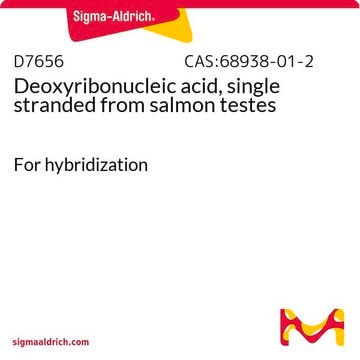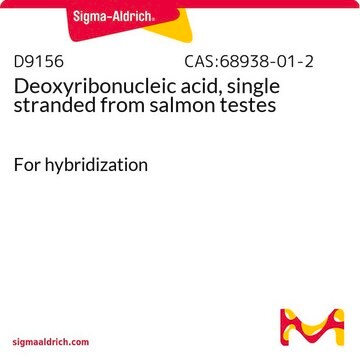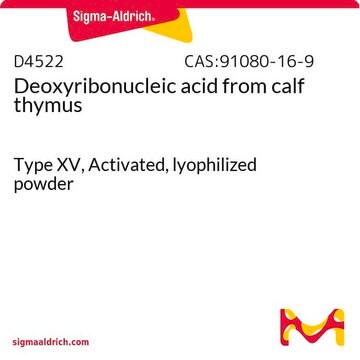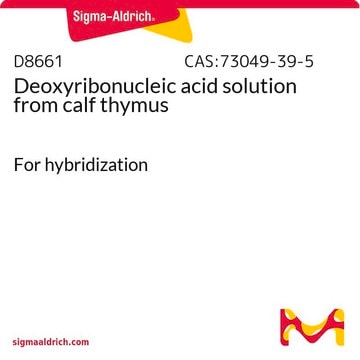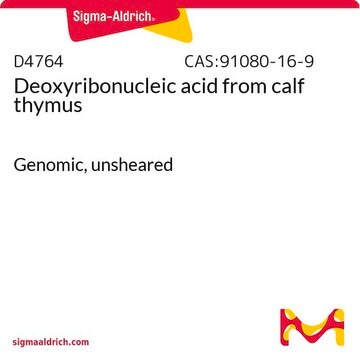D7290
Deoxyribonucleic acid from herring sperm
single-stranded for hybridization
Synonym(s):
DNA
Sign Into View Organizational & Contract Pricing
All Photos(1)
About This Item
CAS Number:
EC Number:
MDL number:
UNSPSC Code:
41106310
eCl@ss:
32160414
NACRES:
NA.52
Recommended Products
biological source
(herring sperm)
grade
for molecular biology
form
solution
shipped in
dry ice
storage temp.
−20°C
General description
Suitable for use as a blocking agent in Southern hybridizations.
Application
Deoxyribonucleic acid from herring sperm is suitable for use as a blocking agent in Southern hybridizations. It was used in preparation of brain sections of mice for BrdU immunohistochemistry. It was also used for hybridization reaction of dot blot membranes.
Many factors contribute to the signal-to-noise ratio in nucleic acid hybridizations. These factors include the presence of solvent (formamide), hybridization temperature, length of hybridization, volume of hybridization solution, degree and method of agitation, use of blocking reagents, concentration and specific activity of the probe, use of molecular agents to increase the rate of nucleic acid reassociation, and the degree of stringency used during the washing of the membrane.
In order to decrease any non-specific hybridization of the probe to a substrate, blocking agents must be used. Generally, a combination of blocking reagent, detergent, and denatured, fragmented DNA is used to accomplish this. Sigma offers sonicated, denatured DNA from a variety of species for use as a blocking agent in Northern and Southern blotting and other nucleic acid hybridization techniques.
In order to decrease any non-specific hybridization of the probe to a substrate, blocking agents must be used. Generally, a combination of blocking reagent, detergent, and denatured, fragmented DNA is used to accomplish this. Sigma offers sonicated, denatured DNA from a variety of species for use as a blocking agent in Northern and Southern blotting and other nucleic acid hybridization techniques.
Preparation Note
This DNA is phenol-chloroform extracted, ethanol precipitated, and sonicated to produce single-stranded fragments which comigrate with the 587 and 831 base pair marker fragments.
Other Notes
DNA in solution will reanneal on standing at room temperature so it is recommended to boil the solution for 10 minutes and then cool on ice for at least 5 minutes prior to use.
related product
Product No.
Description
Pricing
Storage Class Code
11 - Combustible Solids
WGK
WGK 3
Flash Point(F)
Not applicable
Flash Point(C)
Not applicable
Personal Protective Equipment
dust mask type N95 (US), Eyeshields, Gloves
Certificates of Analysis (COA)
Search for Certificates of Analysis (COA) by entering the products Lot/Batch Number. Lot and Batch Numbers can be found on a product’s label following the words ‘Lot’ or ‘Batch’.
Already Own This Product?
Find documentation for the products that you have recently purchased in the Document Library.
Customers Also Viewed
Hanbin Ma et al.
Scientific reports, 3, 2730-2730 (2013-09-26)
Herein, we describe a novel integrated biosensor for performing dielectric spectroscopy to analyze biological samples. We analyzed biomolecule samples with different concentrations and demonstrated that the solution's impedance is highly correlated with the concentration, indicating that it may be possible
Minna M Poranen et al.
Journal of virology, 80(16), 8081-8088 (2006-07-29)
Virus-induced changes in cellular gene expression and host physiology have been studied extensively. Still, there are only a few analyses covering the entire viral replication cycle and whole-host gene pool expression at the resolution of a single gene. Here we
Simon A Joosse et al.
BMC cancer, 7, 43-43 (2007-03-09)
Array Comparative Genomic Hybridization (aCGH) is a rapidly evolving technology that still lacks complete standardization. Yet, it is of great importance to obtain robust and reproducible data to enable meaningful multiple hybridization comparisons. Special difficulties arise when aCGH is performed
Marloes Prins et al.
PloS one, 8(12), e83835-e83835 (2014-01-01)
Multiple sclerosis (MS) has been mainly attributed to white matter (WM) pathology. However, recent evidence indicated the presence of grey matter (GM) lesions. One of the principal mediators of inflammatory processes is interleukin-1β (IL-1β), which is known to play a
Alexandra Plácido et al.
PloS one, 15(2), e0229659-e0229659 (2020-02-27)
The cultivation of genetically modified organisms (GMO) continues to expand worldwide. Still, many consumers express concerns about the use of GMO in food or feed, and many countries have legislated on labelling systems to indicate the presence of GMO in
Our team of scientists has experience in all areas of research including Life Science, Material Science, Chemical Synthesis, Chromatography, Analytical and many others.
Contact Technical Service

